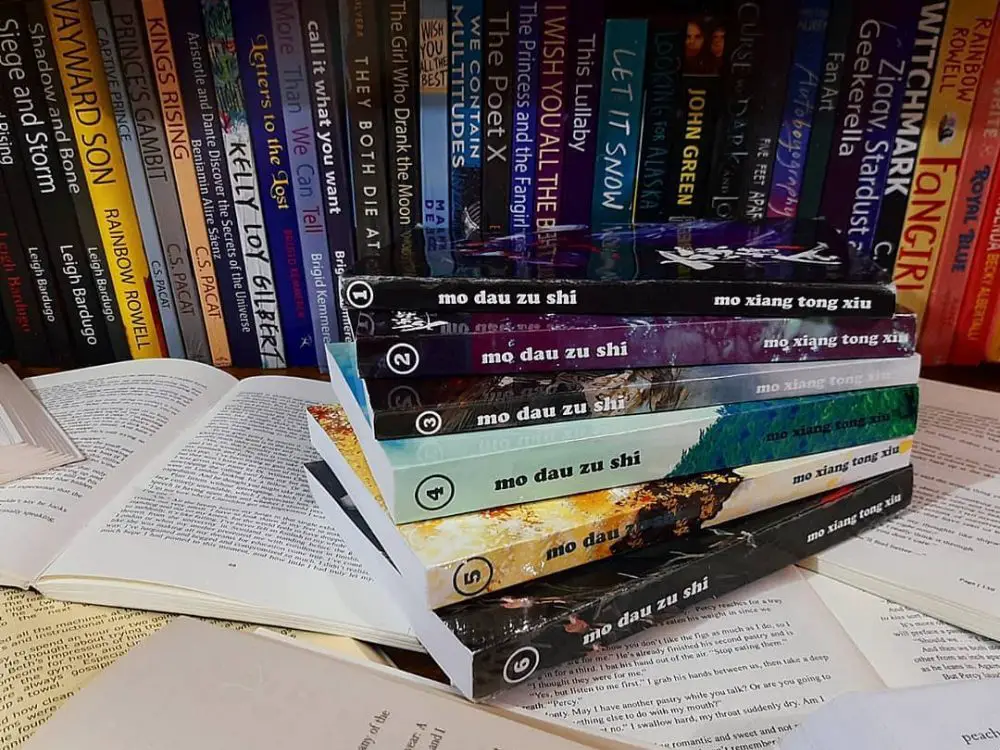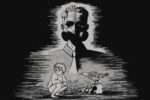When it comes to writing or airing LGBTQ+ themed works in China, censorship restrictions make it difficult to fully publish without consequences. Although same-sex activity was legalized in 1997, media portrayals of same-sex relationships have yet to be fully tolerated by China’s ambiguous laws. However, this does not stop Chinese LGBTQ+ supporters from wanting and releasing more content. Mò Xiāng Tóng Xiù (MXTX), an anonymous Chinese author who is well-known for writing “danmei” or BL (Boy Love) novels, challenges China’s media censorship on LGBTQ+ themes in her three published novels depicting gay romance.
The Xianxia Genre Explained and What It Entails
Each story in the novels of Mò Xiāng Tóng Xiù takes place in a “cultivation” world, typically with cultivators as the main protagonists. Cultivators are individuals who practice martial and mystical arts, striving to possess divine power and/or immortality. However, obtaining and harnessing these abilities is no easy feat.
Through years of routine training, cultivators develop their Qi — fundamental energy that constitutes health — to acquire the resources they need to use their godlike abilities. Cultivation techniques, similar to the Qi gong practice, aid the formation of their inner Cores, a golden orb materialized from concentrated Qi. These cores supply spiritual energy to the recipient and escalate their cultivation level, resulting in faster skill development and longevity.
Xianxia novels feature high fantasy elements. The cultivators develop their supernatural abilities, and magical entities such as ghosts, demons and beasts make frequent appearances throughout. The stories take place in a setting that resembles ancient China, with the architecture, inventions and clothing being carbon copies of what would be seen in a historical Chinese setting. The main exception, of course, is all the magical components that accompany them.
While many xianxia-themed stories involve an action-packed storyline full of adventure, combat and unfolding mysteries, some may also include a romance between characters. In particular, Mò Xiāng Tóng Xiù’s novels highlight the budding relationship between two male leads.
Warning: Spoilers Ahead!
1. Grandmaster of Demonic Cultivation
“Mo Dao Zu Shi,” also known as “Grandmaster of Demonic Cultivation” or “Founder of Diabolism,” tells the story of protagonist Wei Wuxian, a talented cultivator who founded the demonic arts, earning him the title of the “Yiling Patriarch.” Hated and feared by all the clans across the land, people describe him as evil and selfish because he uses unorthodox techniques to channel mighty spiritual power.
His death in the First Seige of the Burial Mounds only reassures the spiteful thousands — all except Lan Wangji, a prized disciple and cultivator of the Gusu Lan sect. Before Wei Wuxian dies, Lan Wangji tries his best to get him to abandon the demonic arts and return to old-fashioned cultivation methods. However, through his curious belief that resentful energy can be used for good deeds, and because of a huge secret revealed in the later chapters, Wei Wuxian does not turn away from the diabolic practice and decides to cultivate it further.
His decision triggers a series of unfortunate events that lead to the death of his beloved older sister Jiang Yan Li and her husband, Jin Zixuan — leaving their only son, Jin Ling, an orphan. Many clans begin to blame him for the world’s misfortunes and eventually turn against him, including his younger brother Jiang Cheng. Despite his tarnished name, Lan Wangji stands unwaveringly by his side at the price of his own reputation. But even with Lan Wangji’s efforts to protect Wei Wuxian, ultimately, he is unable to save him from his inevitable doom.
Thirteen years later, they are reunited after Mo Xuanyu, a former disciple of the Lanling Jin sect, performs a self-sacrificing ritual that binds Wei Wuxian’s “evil” spirit to his body. At first, no one realizes that Wei Wuxian has returned to the living. After playing “Wangxian,” the song Lan Wangji composed for him during a past incident, on a bamboo flute to soothe a restless corpse, Lan Wangji immediately recognizes Wei Wuxian.
With its rich plot, tear-jerking moments and the wholesome connection between the two protagonists, it is no wonder that this particular novel got the global recognition and numerous adaptations it deserved.
2. Heaven Official’s Blessing
“Tian Guan Ci Fu,” translated into “Heaven Official’s Blessing,” introduces Xie Lian, a former venerable Crown Prince who ascended to godhood 800 years ago for the first time. However, due to some mishaps, he descended from godhood—twice. The story takes place after he ascends for the third time, but instead of being treated with respect, he is regarded as the laughingstock of all three realms.
Many gods ignore his presence and are reluctant to offer him assistance on his missions; however, he is humble and not spiteful. Instead, Xie Lian treats everyone with the utmost respect and tries his best at everything, making him one of the most admirable and lovable characters in the novel.
With a similar reputation but on a different spectrum, Hua Cheng, the “dangerous” and all-time powerful Ghost King, is feared by the heavens due to his strength that manages to rival 33 heavenly officials. As a result, they are reluctant to involve themselves with him. Although Hua Cheng is seen as an arrogant and fearsome figure by many characters in the novel, he is mysteriously gentle and supportive around Xie Lian.
Through unsubtle actions such as painting a flawless portrait of Xie Lian for his shrine, following and assisting him in his missions and offering him the ownership of his prized armory, Hua Cheng hints that there is more to their relationship than what meets the eye.
Having read the first book in its entirety, I can say for sure that this is my favorite out of all of the MXTX novels. From the intricate and captivating plot line and interesting characters, to the casual descriptions of affection early on, this novel left me smiling after each chapter.
As of right now, there is no live-action series to compare the novel to; however, the manhua (a term for a Chinese comic) so far shows promise in properly depicting the BL romance between the two main protagonists. Additionally, the “Heaven Official’s Blessing” donghua (term for Chinese animation) will be officially released on Oct. 31 and hopefully, it will properly display the connection between Xie Lian and Hua Cheng without too many censors concealing their heartwarming relationship.
3. Scum Villain’s Self-Saving System
“Ren Zha Fanpai Zijiu Xitong,” also known as “Scum Villain’s Self-Saving System,” is a comedy, transmigration BL novel starring Shen Yuan, a modern-day man who died and is transported into a Stallion novel he read. Incarnated into Shen Qingqiu, the antagonist and “scum villain” of that novel, he realizes that he will eventually be tortured and killed by the protagonist, Luo Binghe, as the story progresses.
Shen Yuan, not wanting to resign himself to this fate, tries to figure out ways to avoid the dark path waiting for him. However, due to “The System,” he is forced to abide by the story, stick to his character and follow its predetermined course.
This is Mò Xiāng Tóng Xiù’s first released danmei novel, and the donghua was released last month on Sept. 12, 2020, on YouTube.
Censorship in “The Untamed”
As Mò Xiāng Tóng Xiù’s most famous novel, “Mo Dao Zu Shi” comes with several different media adaptations— an audio drama, donghua, manhua and a drama series on Netflix titled “The Untamed.” All of the adaptations showcase the deep bond between Yiling Patriarch Wei Wuxian and noble Lan Wangji nicely. However, the implications of their relationship contrast greatly in each version.
While the official novel highlights the two men becoming cultivation partners — a term for two married cultivators — “The Untamed” censors the romantic relationship they have. Instead of showcasing them as lovers, the drama series portrays them as close friends with an unbreakable bond. In other words, a “bromance.”
As someone familiar with the official novel, the depiction of their relationship in the live-action series came as a slight disappointment. Given that Mò Xiāng Tóng Xiù intended for the two main protagonists to fall in love after everything they went through together, the bromance looks somewhat out of place. Lan Wangji breaks numerous sect rules for Wei Wuxian despite being a compliant and devoted disciple, stands by his side when the entire world is against him and expresses his adoration through gifts, showcasing the amount of faith and affection he has for him. Not even Wei Wuxian’s brother stands by him when he needs it the most.
Nonetheless, what saves “The Untamed” from being just another LGBTQ+ censored series is the way the main actors portray the protagonists’ undeniable connection. Xiao Zhan, who stars as Wei Wuxian, perfectly captures his mischievous yet selfless personality, while Wang Yibo, who stars as Lan Wangji, skillfully changes the emotion behind his eyes into something softer when looking at his counterpart, despite his own typically stoic personality.
MXTX Updates
In an interview, Mò Xiāng Tóng Xiù disclosed that she was working on a fourth novel called “Sishen Meiyou Xiuxiri,” translated to “Death Gods Don’t Get Vacation Days.” The title may change in the future — however, as of right now, the anticipation for her new novel’s release date speaks higher volumes.

















